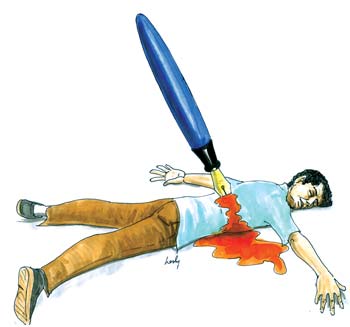Books that shape our thinking

Have you ever asked this question from yourself or from a good friend
nearby? “What’s the book that shaped your thinking and attitudes towards
the life?” If somebody were to ask this question from me, I would say,
without hesitation, Dhammapada.
This may not sound a good question for some as the instant response
perhaps would be ‘books have never shaped my thinking, but people like
my own teachers, may have shaped my thinking.” But this favourite
question remains to be a key question for all times.
Most political scientists just say it is Karl Marx’s Das Capital that
shaped their thinking. The religious teachers would say, if in India,
Bhagavat Gita, Ramayana and Mahabharatha. If in a Christian country one
would say Bible or Talmud.
The response depends largely on the cultural background of the
respondent. We are brought up in a culture largely made up of books, in
which the ideologies are documented.
Once I came to know that Mahatma Gandhi, responding to such a
question, had said that his humanitarian non violence motives were
created as a result of his association with the teachings of Russian
writer Leo Tolstoy. Mahatma added that Tolstoy would have lived in
luxuries if he so desired, as he was a wealthy count who had all the
comforts he wanted.

But by way of a great renunciation, he left them, or discarded as
unwanted, and led a life of a hermit.
Mahatma Gandhi had time to read what Tolstoy had written during his
lifetime which covered largely the recreation of folklore material he
had gathered from peasantry. Herman Hesse, the well known German
novelist and essayist had come to India and according to his notes to
Sri Lanka (then Ceylon) as well.
While in India he had read Hindu and Buddhist texts which had
eventually kindled his creative spark to write the highly acclaimed
novel Siddhartha.
This novel is a recreation of the events and trends in the life of
Prince Siddhartha, who renounced the worldly life in search of a higher
state of emancipation from suffering.
Hesse, whose thinking was shaped through the readings of oriental
texts, stated his creative spark originated from religious
susceptibilities. Hesse undoubtedly is a sensitive creator and observer.
Some years ago, I had the chance of buying a book titled The Harvard
Guide to Influential Books where the subtitle goes as ‘113 eminent
Harvard professors discuss he books that have shaped their thinking’.
Reading the compilation, which in turn too is rather creative, the
professors point out that sources of inspiration and the books that
shaped their thinking had mostly come from the Orient.
Some others point out that they were inspired by authors such as
Proust, Sartre, Freud, Marx, Hegal, Shakespeare, Pearl S. Buck, Tolstoy,
Voltaire, Homer, Goethe, Muller, Nietzsche, Malinowske, Aristotle,
Lawrence, Thorequ, Plato, Joyce and Darwin.
Some books have been inherited as gifts down the centuries. They
receive the attention as dignified and sacred. Such books are treasured
as classics and books for all times, and they remain to be read at all
times.
The five hundred and fifty Jataka tales or the Pansiya Panas Jataka
Potha is one such example. Though it is a collection of the tales of the
Buddha’s previous lives, they are acclaimed as a life-giving force to
people all over the world. In Sri Lanka, Pansiya Panas Jataka Potha is
revered, known as Poth Vahanse by the majority. There are manifold
rediscoveries on the Jataka tales.
Dr. Rhys Davids is one of the few Buddhist scholars who delved into a
pioneer study of the jatakas, or the Buddhist Birth Stories.
He was the scholar who conducted a survey on the comparison of the
Jataka source material with the Western counterparts like Aesop’s tales,
Biblical tales, Canterbury tales, and other folklore and religious
material.
Joseph Jacobs, the well known British author and compiler of fairy
tales, too brought out a pioneer collection of Jataka tales and
Panchatantra tales titled as ‘Indian fairy Tales’. These works enabled
the scholars to get a glimpse of the oriental works.
Once professor Ediriweera Sarachchandra told me a good creative
dramatist cannot afford to miss the collection of Jataka tales as it had
moulded the mass conscience of our country. His stock in the trade had
been the Jataka tales.
He wrote two novels recreated from Jatakas titled as Vilasiniyakage
Prema Kathava based on Kanavera Jataka, and another which was not titled
and remained in the manuscript stage based on a lesser known Jataka
tale. His plays Maname, Vessantara, Lomahansa, Mahasara, Kada Valalu and
Pemato Jayathi Soko are based on Jataka tales.
At a time when a so called interest is kindled by the state as well
as the private book publishers on ‘books and reading’, these few notes
may be of some significance to rethink of one’s own stance in the
literary scene.
[email protected] |



